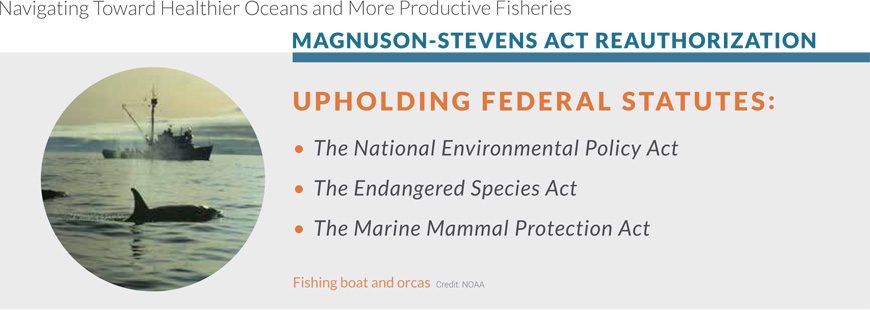The Issue
The Magnuson-Stevens Fishery Conservation and Management Act (MSA), the National Environmental Policy Act (NEPA), the Endangered Species Act (ESA), and the Marine Mammal Protection Act (MMPA) serve distinct but complementary purposes for responsible ocean conservation. All four statutes are needed to ensure the sustainable management of U.S. fishery resources through a broad ecosystems approach.
The fishery management system under the MSA is primarily intended to authorize and manage fishing activities. It is not designed to fully examine the broader impacts of its management decisions to the marine ecosystem, as these other laws do:
ESA: protects and recovers imperiled species and the critical habitats they depend on
MMPA: protects marine mammals and prevents unauthorized harm or killing
NEPA: provides a comprehensive analysis of and a plan to prevent or mitigate environmental impacts associated with proposed federal actions, such as oil and gas exploration.
These federal laws are integral to maintaining balance and common sense where environmental decision-making is concerned. They are the American public’s guarantee of informed participation in the process of deciding federal actions affecting our environment, as well as the country’s primary means for lessening the impact on the environment by federal agencies’ actions. These federal statues and the agencies charged with carrying them out ensure that citizens and all those who use our public marine resources have a chance to participate in decisions and to confirm that all information and consequences are considered before action is taken.
Under the MSA, NOAA Fisheries must accept the management decisions of the eight regional fishery management councils, provided that they are consistent with the Act’s provisions and with the statutory and regulatory standards outlined by the ESA, MMPA, and NEPA. When these federal laws mandate management measures or procedures contrary to the objectives of regional councils, however, the councils often challenge the requirement to comply.
The Network’s Position
The Network recognizes that each of these laws is needed to ensure healthy oceans and productive fisheries. The MSA is concerned only with regulating fishing; likewise, the ESA is concerned only with endangered species, the MMPA only with marine mammals, while NEPA is dedicated entirely to transparent and informed decision-making. Each of these statutes uniquely regulates government-endorsed activities that can – and often do – impact the sustainability of American fisheries.
Therefore, reauthorization of the MSA must not weaken or negate any of those essential federal laws. Reauthorization of the MSA must allow each to function as Congress intended, requiring independent examination of the relevant issues by both the public and by the federal agency having the expertise needed to make a properly informed decision.
Recommendations and Actions for Reauthorization
- Oppose any language that conflicts with and/or undermines the explicit provisions and legislative intent of the ESA, the MMPA, or NEPA, or alters the respective federal agencies’ responsibilities under those statutes.
- Oppose any Congressional attempt to override the distinct analysis and consultation requirements of the MSA, ESA, MMPA, and NEPA.
- Oppose any language that would limit any authority, responsibility, or discretion of federal agencies (NOAA and the U.S. Fish and Wildlife Service) to implement these federal statutes or to act on options approved by the regional councils that would do the same.
- Continue to press the agencies to better coordinate their roles and efforts to address the distinct mandates imposed by each statute. This will ensure more efficient and better-informed decision-making processes.





